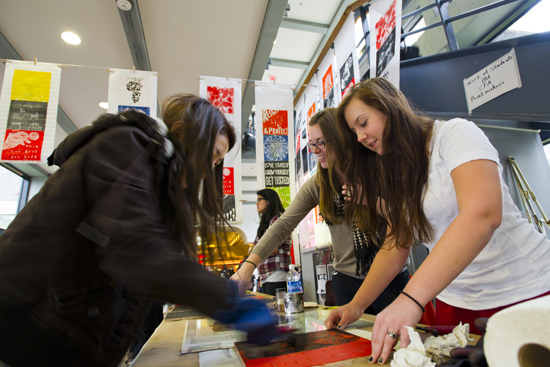World AIDS Day on Campus
Wear red, and get tested

Today, December 1, marks the 22nd anniversary of World AIDS Day, which commemorates the 25 million people who have died from the disease since it was discovered in 1981. The annual event hopes to make people aware of, and improve education about, the transmission of HIV.
Today and tomorrow events on campus promote the theme of this year’s World AIDS Day: Universal Access and Human Rights. The Student Activities Office, the Community Service Center and its AIDS prevention and awareness group Project Hope, and BU’s largest annual fundraiser, Dance Marathon, an annual student event whose proceeds go to children and families coping with HIV/AIDS, are sponsoring films, discussions, and free HIV testing.
“In the past, World AIDS Day has been made up of various events throughout the week,” says Zhandra Ferreira-Cesar (SPH’11), Project Hope advisor. “Attendance varies per event—however, as a campus our undergraduates are very committed to spreading awareness on the issue and every year demonstrate an overwhelming amount of interest in learning more.”
There are now 33.3 million people infected with HIV worldwide. The U.S. Centers for Disease Control and Prevention estimates that more than one million people in the United States are currently living with HIV. One in five of those people is unaware of being infected, and each year more than 56,000 Americans are newly infected. And despite the introduction of antiretroviral drugs, which significantly prolong life for those living with the disease, 18,000 people in this country alone still die from AIDS each year.
Since the beginning of the epidemic, more than 40,000 people between the ages of 13 and 24 have been diagnosed with AIDS in the United States, and an estimated 10,129 have died, according to the CDC.
Today, BU’s Dance Marathon will have tables in the George Sherman Union Link offering commemorative red ribbons and free condoms. The condoms will have facts printed on them, such as “Every 12 seconds, someone contracts HIV,” and “2/3 of college students do not consistently use condoms.” A section of the AIDS Memorial Quilt will also be on display in the HowardThurman Center today and tomorrow.
The Lazarus Effect is a documentary depicting the effectiveness of antiretroviral drugs in Zambia. The film will be shown as part of World AIDS Day today at 3 p.m.
 World AIDS Week events:
World AIDS Week events:
Wednesday, December 1
1 to 4 p.m.
Free Rapid HIV Testing
George Sherman Union, 3rd floor
3 p.m.
Film: The Lazarus Effect
A film depicting the effectiveness of antiretroviral drugs in Zambia. Sister Sheila, who works with HIV-positive women in South Africa, will lead a discussion about HIV in developing countries following the film.
Howard Thurman Center, basement of the GSU
5 p.m.
Candlelight Vigil: Remember Those Who Have Been Lost to AIDS
Marsh Plaza
7 to 8:30 p.m.
Panel Discussion: The Face of AIDS in Boston
Led by Sophie Godley (SPH’15), a School of Public Health instructor, the panel includes a physician from the Vaccine Trial Network and representatives from the Women of Color Roundtable, the Transcend Program at AAC, and the state Department of Health and Human Services. They will discuss the social implications of living with the disease in one of the largest U.S. cities.
GSU Conference Auditorium, Room 228
Thursday, December 2
1 to 4 p.m.
Free Rapid HIV Testing
George Sherman Union, 3rd floor
7 to 8 p.m.
Guest Speakers
Mark, owner of a production company, and Terrance, 18, both former campers at Camp Heartland, which since 1993 has provided a respite for kids with HIV/AIDS, will speak about the challenges of living with HIV.
GSU Conference Auditorium, Room 228
Kimberly Cornuelle can be reached at kcornuel@bu.edu.
Comments & Discussion
Boston University moderates comments to facilitate an informed, substantive, civil conversation. Abusive, profane, self-promotional, misleading, incoherent or off-topic comments will be rejected. Moderators are staffed during regular business hours (EST) and can only accept comments written in English. Statistics or facts must include a citation or a link to the citation.